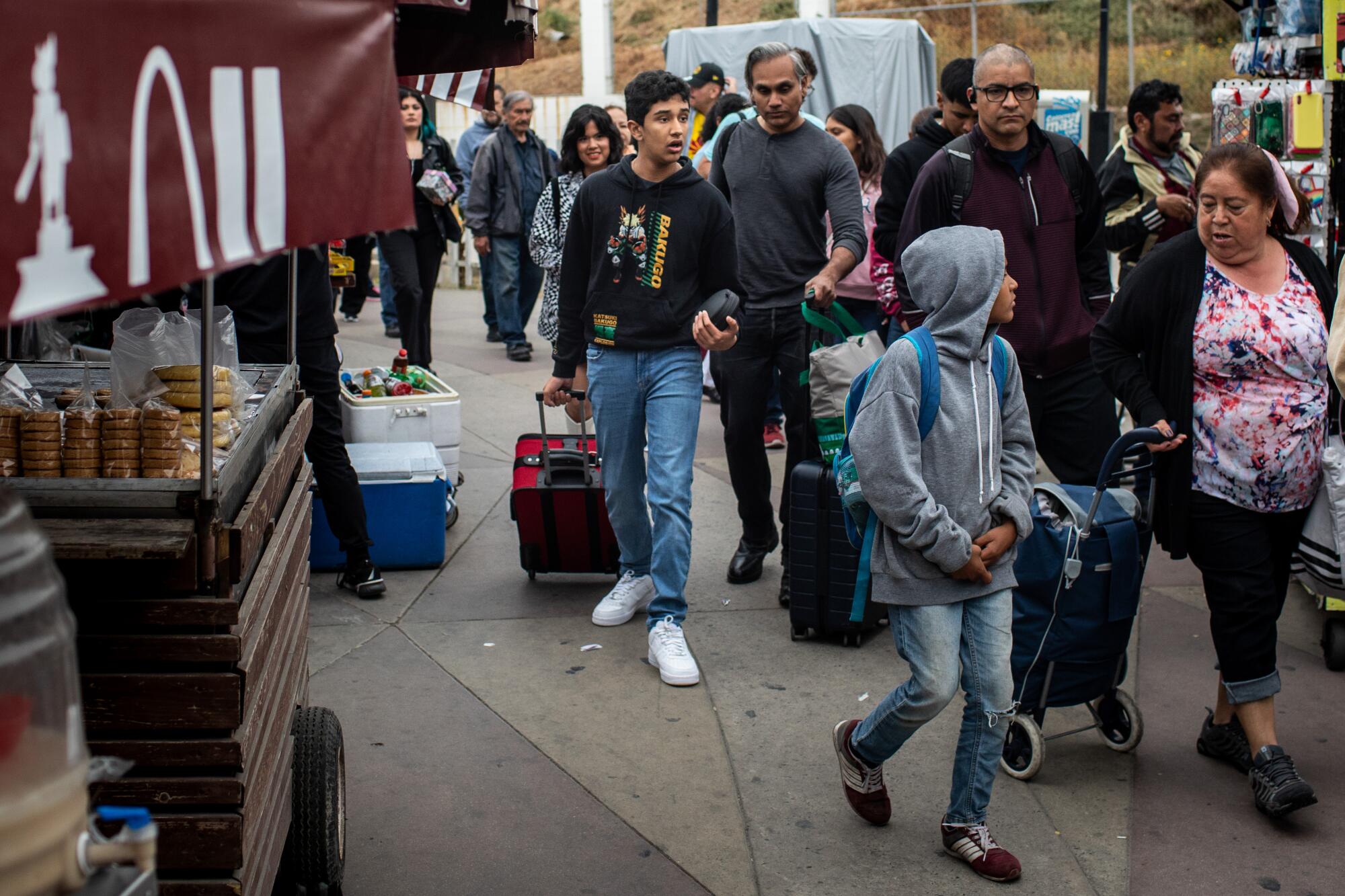
- Share via
TIJUANA — On the surface, Dr. Pradyuman Singh has all the makings of the immigrant American dream. He has a business recruiting students to medical schools; a wife, son and daughter who is pre-med at UC Irvine; and his family lives in a Laguna Niguel home with ocean views.
But his picturesque life in the U.S. has been unraveling almost since it started. Now Singh is separated from his family and stuck 90 miles away, just across the border in Tijuana.
The Singhs are just one family making their way through the labyrinthine U.S. immigration process. But their experience shows that not even higher education, wealth and investments in the U.S. may make a difference when it comes to navigating a system that for many has become a bureaucratic black hole.
Singh, 55, arrived in the U.S. with his wife and daughter in 2008 on a work visa after he purchased a motel in Kansas City, Kan., where members of his extended family lived. The family landed in deportation proceedings in 2011 after his visa renewal was denied, but because of court backlogs and scheduling issues, he said, they didn’t get their day in court until this summer.
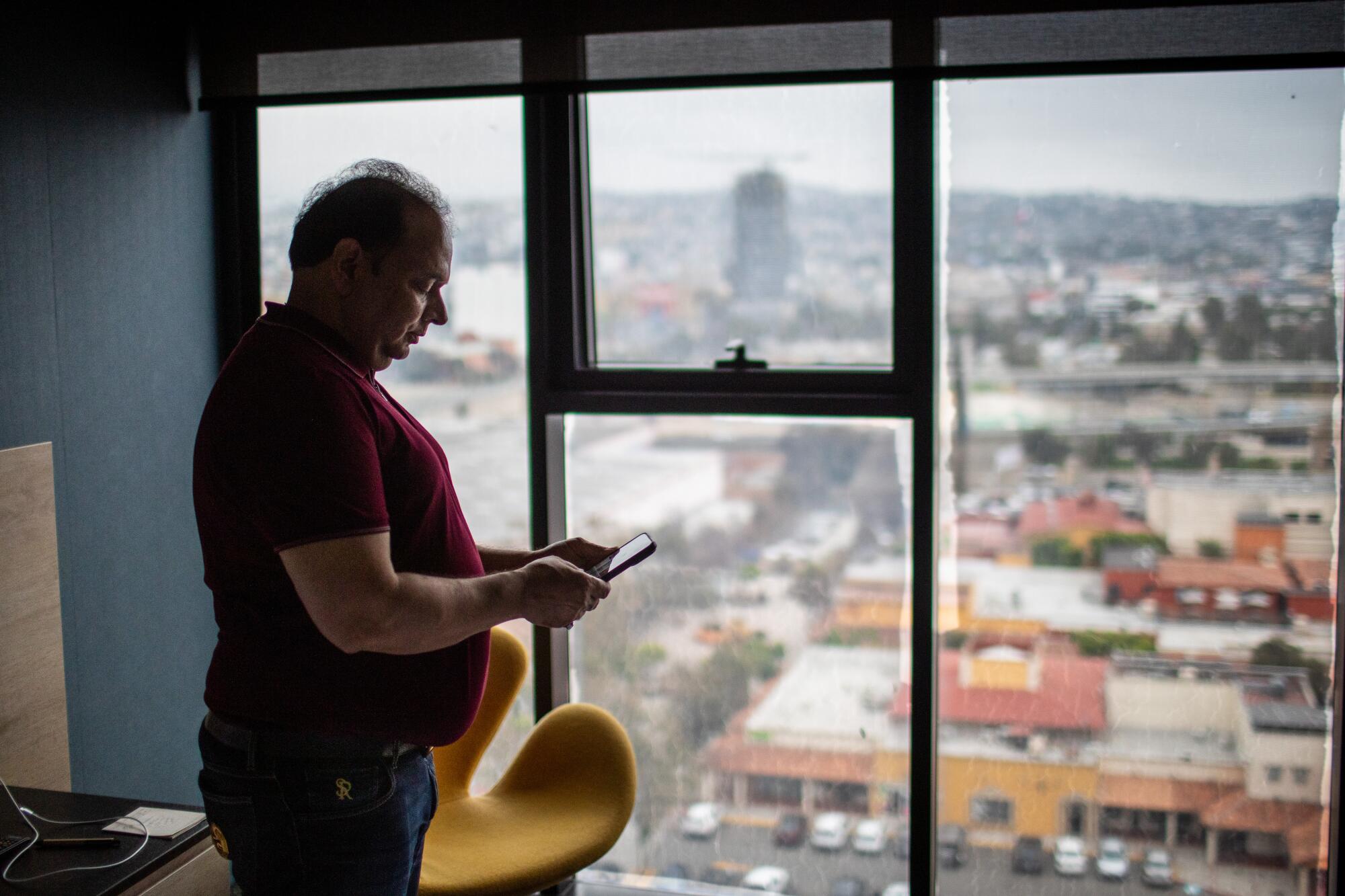
And despite having invested nearly $1.6 million in the motel, according to Singh’s application for an investor visa, that petition — which would grant the family permanent residency — remains pending.
“Our system is very unforgiving,” said Theresa Cardinal Brown, senior advisor on immigration for the Bipartisan Policy Center. “Once you are out of status or have violated a status, it is very difficult to get a status back.”
Just before the world began to grapple with the COVID-19 pandemic, the family faced yet another setback: Singh’s mother-in-law in India was diagnosed with bacterial meningitis and placed in a medically induced coma.
Singh had worked as a medical doctor in Russia, so his wife begged him to go care for her mother. He went, he said, with assurances from local immigration agency offices that he was likely to be let back in. He wasn’t.
Earlier this year, Singh took up residence in a hotel less than a mile from the U.S. border in Tijuana. There, his 12-year-old son Anirudh, who was born in the U.S., can occasionally visit — because Singh’s wife and daughter lack legal U.S. documents, they are unable to make the trip with him.
The family is at a crossroads. In June, an immigration judge dismissed their case, clearing their immediate risk of deportation but dissolving their petition to bring Singh back to the U.S. for proceedings.
Now, from the Mexican side of the border wall, Singh wonders whether he and his family should return to India — and if it was a mistake to have moved to the U.S. in the first place.
1
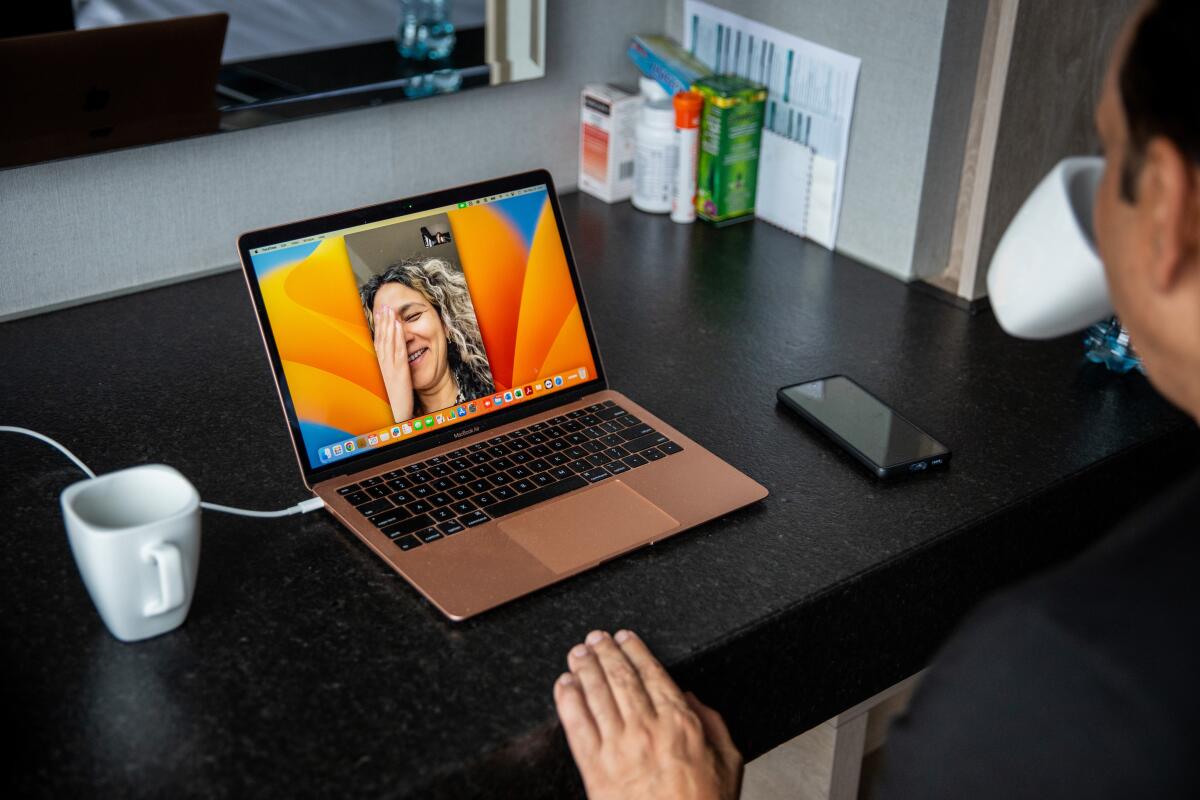
2
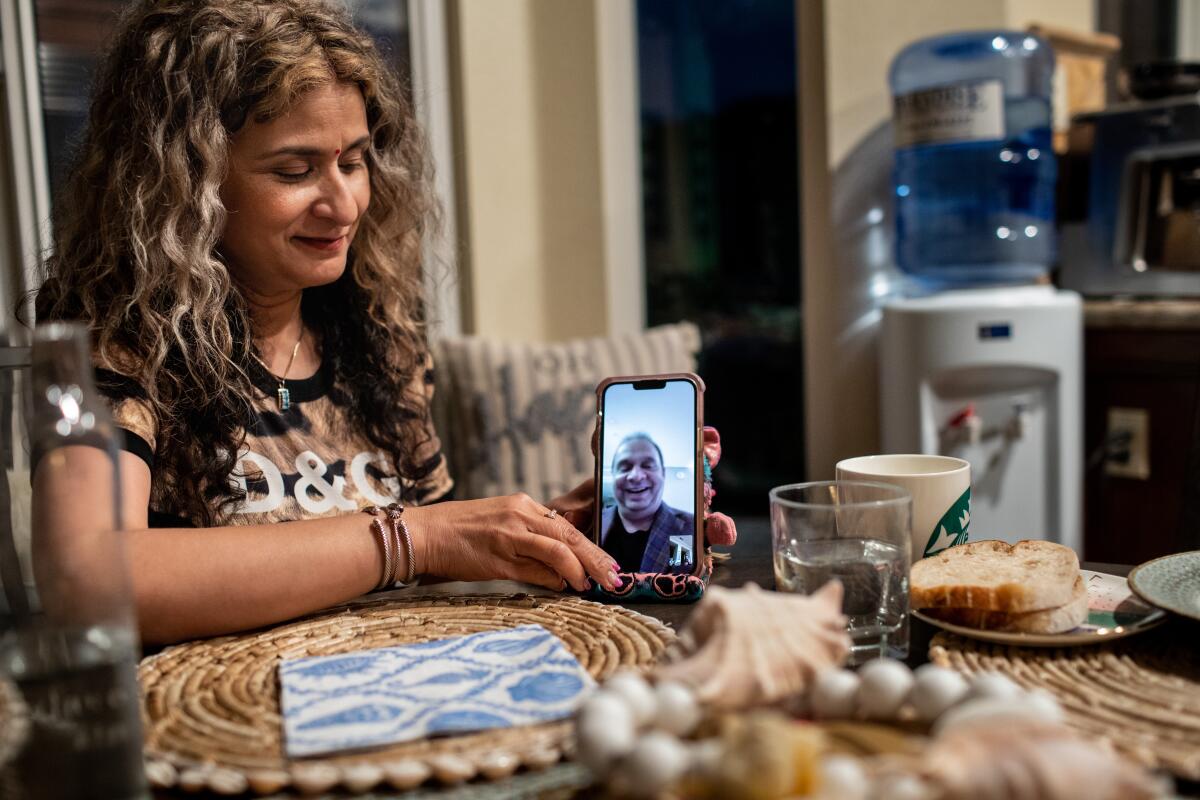
1. Dr. Pradyuman Singh talks with his wife, Shashi, via Facetime, with morning coffee, in his room at the Quartz Hotel & Spa in Tijuana. 2. Shashi Singh holds a phone Facetiming with her husband while at the dinner table with their daughter and son at home in Laguna Niguel. (Jay L. Clendenin / Los Angeles Times)
“I never thought things would end up that way,” he said. “It has been a nightmare for us.”
Before immigrating to the U.S., Singh said, he had a thriving business in India recruiting students there to medical schools in Russia, where he had gotten his own medical degree. In 2007, he and his family flew to Kansas City to visit relatives. Seeing a good opportunity to advance in the U.S., Singh bought a motel and moved to the area with his wife, Shashi, and then-8-year-old daughter Elena.
But just two years after his family’s move, Singh‘s journey was in peril. He would soon face more than a decade of roadblocks in his efforts to gain legal status.
In September 2010, he was in Russia on a business trip when he learned his visa renewal application was denied. According to the denial letter, despite being a business owner, Singh did not qualify as an executive and wasn’t eligible for the L-1 visa, which allows companies to transfer executives and managers abroad to the United States.
Singh said he tried to reach his lawyer at a Chicago firm that had been recommended by a family friend but never heard back. Unbeknownst to Singh, the man whom he believed to be his lawyer, Tahawwur Rana, was not a licensed attorney. Rana was convicted in 2011 of providing support to an Islamist militant group and allegedly plotting an attack on a Danish newspaper.
Many service providers, sometimes called consultants or brokers, are not licensed attorneys or accredited representatives and are not qualified to provide legal advice.
Singh’s paperwork was signed by Raymond J. Sanders, an attorney described in news reports as Rana’s business partner, who was not charged in Rana’s case. Reached by phone, Sanders’ wife, Barbara Murphy-Sanders, said her husband, 90, suffers from Alzheimer’s and dementia and wouldn’t remember the case.
1
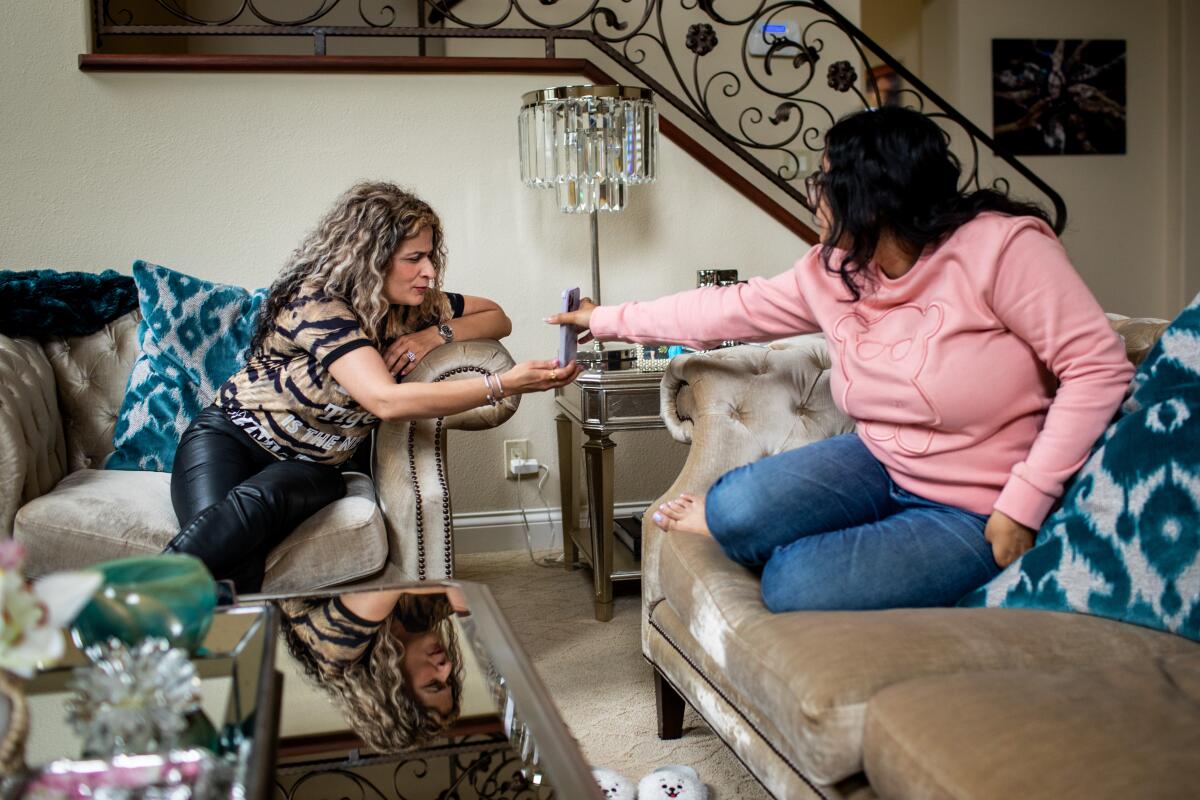
2
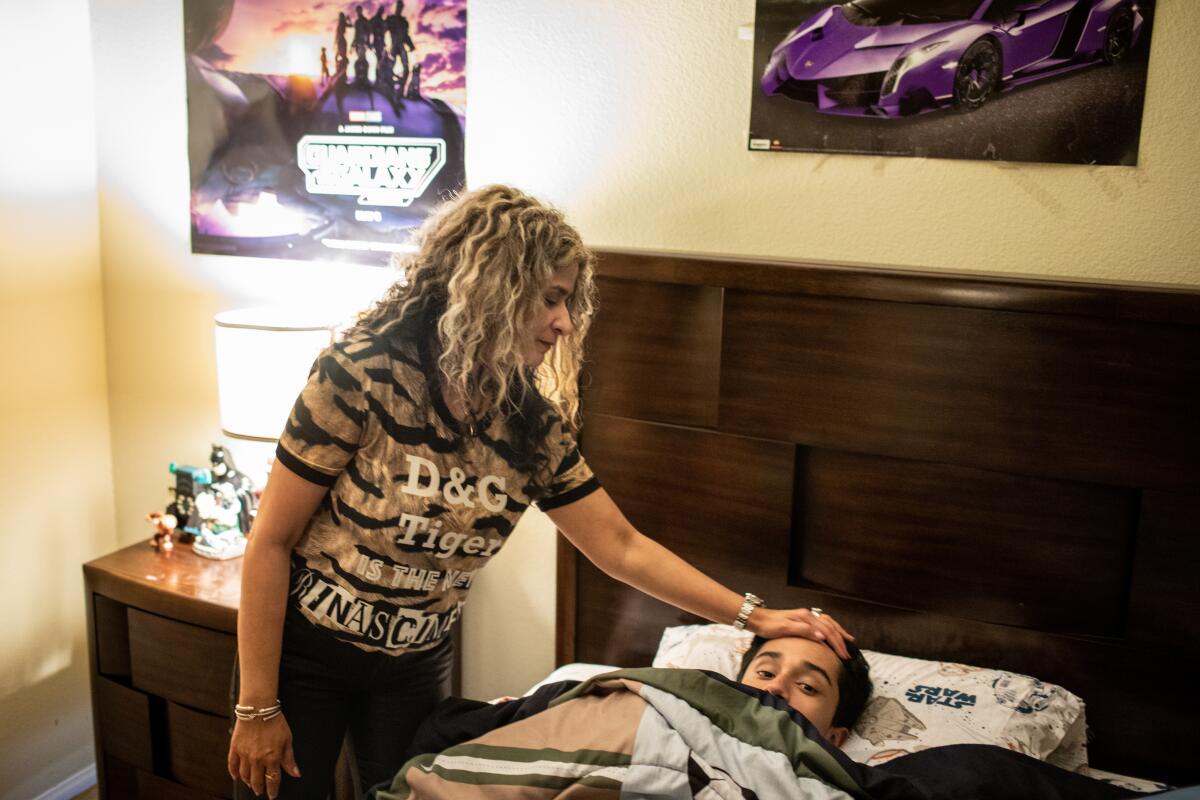
3
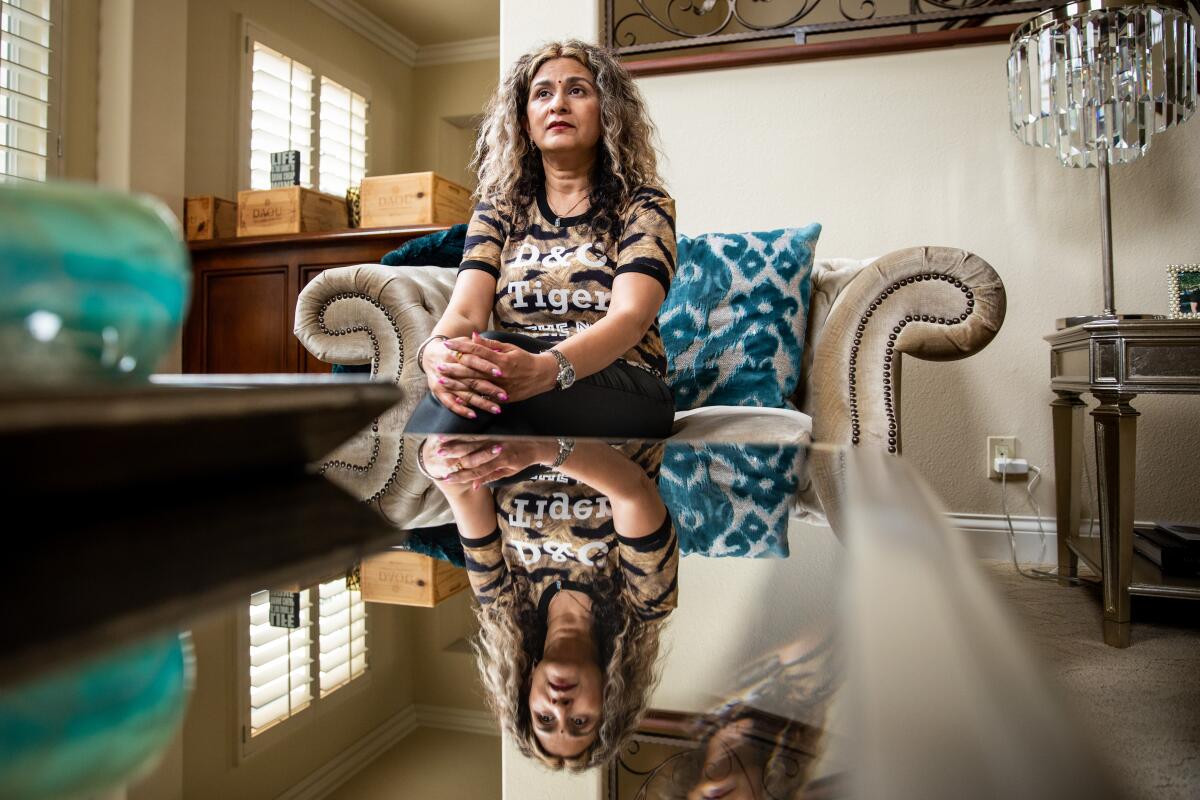
1. Shashi Singh reviews a food delivery order with her daughter Elena, 22, at home in Laguna Niguel. 2. Shashi Singh says goodnight to her son, Anirudh, 12. 3. Shashi Singh has not seen her husband in person since March 2020. (Jay L. Clendenin / Los Angeles Times)
After receiving the L-1 denial, Singh returned to the U.S. on a tourist visa. His son, Anirudh, was born in November 2010.
They didn’t have long to celebrate. The following year, the family was placed in deportation proceedings for overstaying their original visas.
So Singh tried a different route. Based upon his ownership of the Kansas City motel, he applied in 2012 for an EB-5 visa, which offers a pathway to citizenship for immigrants who invest $1 million in a business that creates at least 10 full-time jobs within two years of the visa’s approval. But three years later, that petition was denied because Singh had used loans to make the purchase.
Immigrants such as Singh, who applied for EB-5 visas based on investments funded by loans, filed a class-action lawsuit in 2015 against U.S. Citizenship and Immigration Services over their denials. Applicants said they were blindsided by a new rule against using certain loans toward visa investment.
In 2020, a Washington, D.C., circuit court ruled in favor of the plaintiffs, vacated the denials and ordered the federal agency to reconsider their petitions. But the ruling established no timeline, and Singh hasn’t received a new decision on his application. Even if it is approved, he will have to request a waiver to reenter the U.S. — and whether he is granted one is up to the government’s discretion.
Still in immigration limbo, Singh’s obstacles continued to mount. The family’s deportation proceedings were taken off the court calendar and placed on an indefinite hold. Singh’s driver’s license expired in 2012, setting off years of persistent fear that he would be stopped by the police.
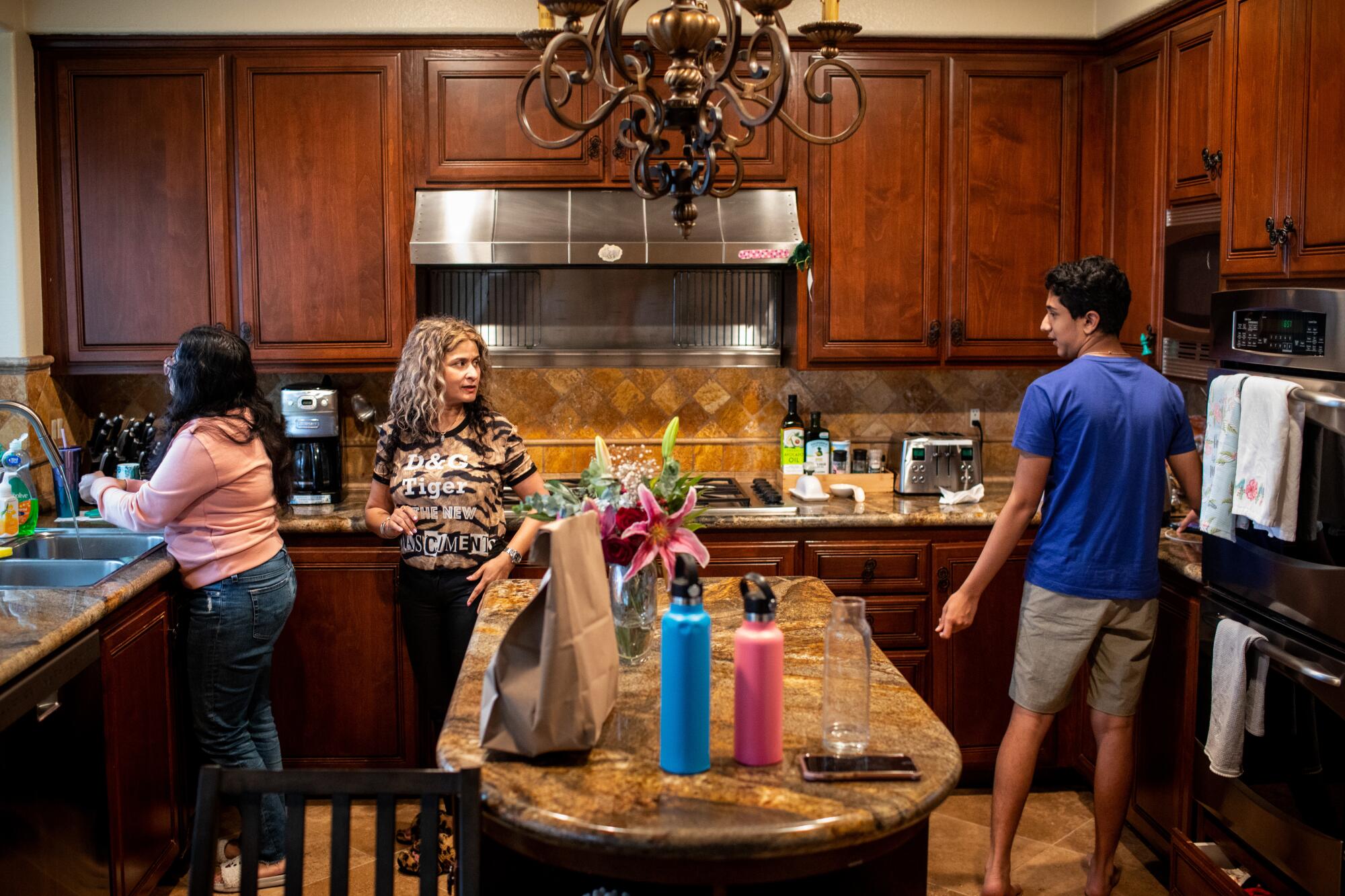
But a glimmer of hope came in 2016, when he learned of a California law creating driver’s licenses for immigrants without legal status. Tired of feeling paranoid, the Singhs left Kansas and rented a 3,500-square-foot home tucked inside a gated community in the hills of Laguna Niguel.
Life improved. Singh started a California subsidiary of his medical recruitment business. Shashi’s anxiety eased and she joined community fitness classes. Elena quickly made friends and excelled in school, deciding she would pursue medicine just like her dad. And Anirudh took up piano, violin and karate.
It wasn’t long, however, before the family faced more hardship. In late 2019, Shashi’s mother contracted a life-threatening case of bacterial meningitis. Panicked, Shashi begged her husband to go to India and supervise her mother’s care. She had distrusted the Indian medical system since her father died of a heart attack, despite assurances from medical staff that he would survive.
Singh and his immigration lawyer, Glen Raj, sought emergency travel permission. During in-person meetings at local U.S. Citizenship and Immigration Services and Immigration and Customs Enforcement offices, both agencies said they couldn’t provide travel permission but, according to Singh and Raj, said Singh should have no problem returning on humanitarian grounds. U.S. Citizenship and Immigration Services declined to comment on Singh’s case.
He left on March 7, 2020, four days before the World Health Organization declared the COVID-19 outbreak a pandemic.
Shashi’s mother survived. But three months later, when Singh was ready to return home to Laguna Niguel, he found dead ends on every route.
Lisa Ramirez, a California immigration attorney who consulted on Singh’s immigration case, said he shouldn’t have left the country because it was too risky given his pending deportation case.
“I have a lot of desperate clients that also have emergencies. In my opinion, it was at worst foolish, at best necessary for him to depart,” she said. “There is no advance parole, no permission to travel when someone is in [removal] proceedings. That’s just the bottom line.”
But Ramirez added that the broader issue is how long it takes the government to process applications. Singh has what many immigrants don’t — the resources to pay attorneys to file various applications, represent him in court and contact members of Congress about his case — and still faces high hurdles.
A recent report by the libertarian Cato Institute, “Why legal immigration is impossible for nearly everyone,” explains that the U.S. ranks in the bottom third of wealthy countries for a foreign-born share of the population, with less than 1% of people who want to immigrate legally able to do so.
Cardinal Brown, of the Bipartisan Policy Center, noted that families being separated or children with U.S. citizenship forced to leave the country when their parents are deported are common stories. So too is the story of a family who arrived legally, tried and failed to retain their legal status, and remained without legal documentation.
“Here’s somebody who doesn’t have an easy way to come — a job offer, a U.S. family member to sponsor them — so they’re trying to make their own case to immigrate,” she said of the Singhs. “But the United States is not built that way.”
Singh’s family didn’t hold up well in his absence. Anirudh wrote a letter to Santa in 2020 asking for his dad to come back. On Christmas Day, Shashi said, he opened every door in the house, asking, “Is Dad here?”
In February 2021, a clinical psychologist conducted an assessment of Anirudh, finding that the separation from his father had caused him “intense stress” and anxiety.
“Anirudh and his family were confronted with family separation at the same time as they faced instability, fear, and chaos due to the global pandemic,” psychologist Malena Vinocur wrote in the assessment, which the family provided to The Times. “When asked about this, Anirudh stated tearfully, ‘My dad not being here… it ruins everything.’”
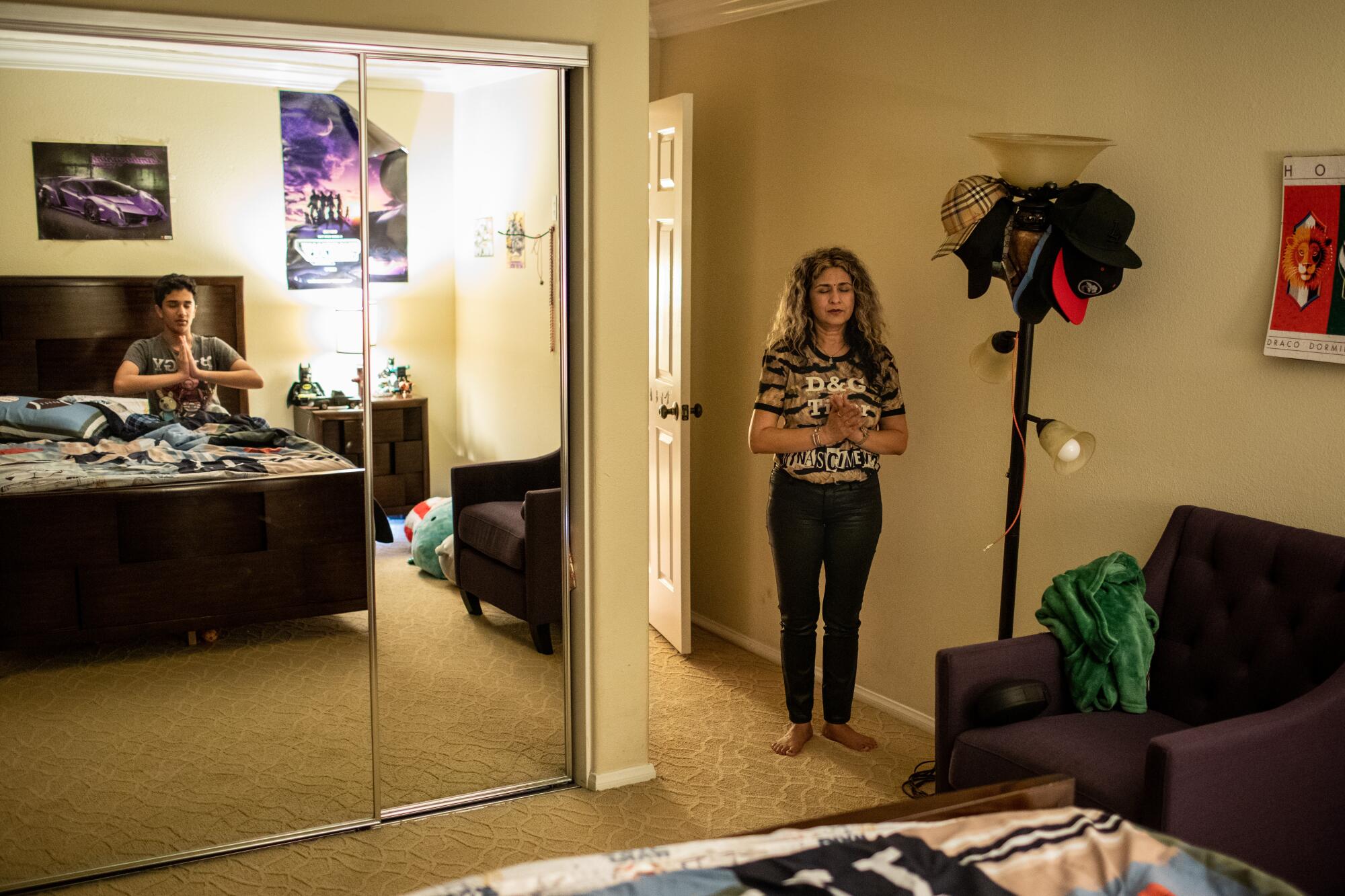
Elena moved home from a dorm at UC Irvine, where she had just completed her first quarter, as the campus shut down because of the pandemic. When the campus reopened, she considered moving into an apartment with friends. But she couldn’t bear to leave her mom and brother.
“We’ve gotten past the public health crisis, but my family is still in crisis,” she told The Times.
The family, once ashamed of their immigration status, opened up about their experiences to a small circle of friends whom they leaned on for support.
But as the months dragged on, Shashi grew increasingly anxious. She said she feels guilty about asking her husband to go to India to take care of her mother. She’s also angry at a U.S. immigration system that allowed her family to slip through the cracks despite their repeated attempts to do things lawfully.
“I tried my best to be strong for my kids,” Shashi said, tearing up, “but I’m not that much strong anymore.”
Pradyuman Singh has twice requested humanitarian entry through the U.S. Consulate in India. The first request was denied; he said he was never contacted for an interview the second time. In an August 18, 2022, letter to Singh’s attorney, Department of Homeland Security parole unit chief Timothy Meadows wrote that entry under parole cannot bypass regular immigration procedures and that “the totality of the equities in [Singh’s] case does not warrant a favorable exercise of ICE’s discretionary parole authority.”
In January, Singh obtained a Mexican tourist visa and flew from India to Tijuana to meet Raj, his lawyer. They requested humanitarian parole, which was denied.
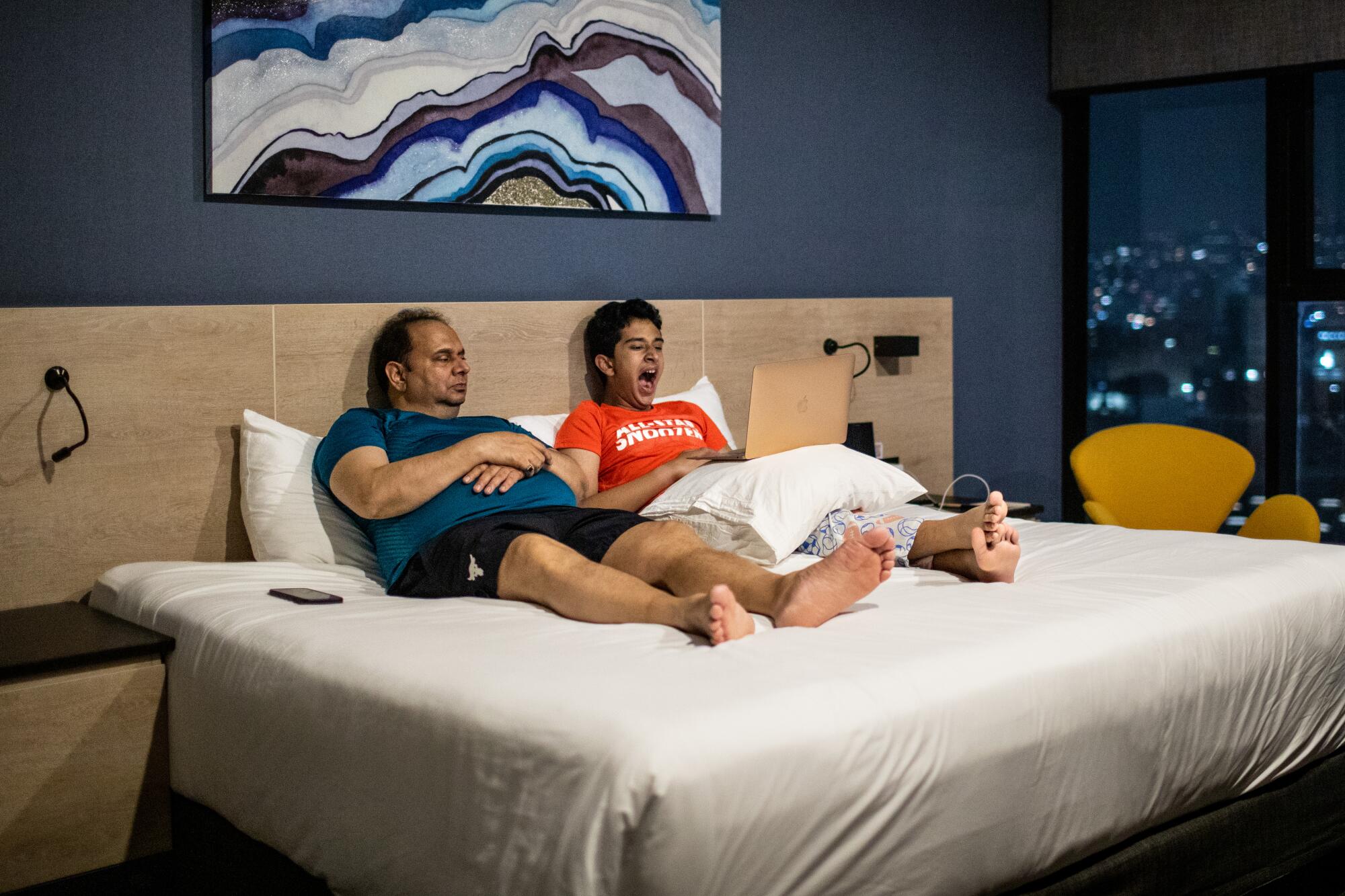
They asked again for humanitarian parole in May. Citing Singh’s medical recruitment agency, he also requested entrepreneur parole, which is for immigrants who can prove that their startup would provide a significant public benefit. Both applications remain pending.
“The Singhs are not lawyers and they don’t have a USCIS handbook. They fell in love with this country; they solicited legal advice and lawyers including me provided them with advice; they followed that advice,” Raj said. “The Singhs never ran, never tried to do anything false, tried to adhere with every single law possible.”
For Singh, living in Tijuana provided another benefit — seeing his son, the only member of the family with a U.S. passport. On their most recent visit, they went shopping at a mall, ordered room service and watched “Die Hard” on Singh’s laptop, lying side by side until they drifted off to sleep.
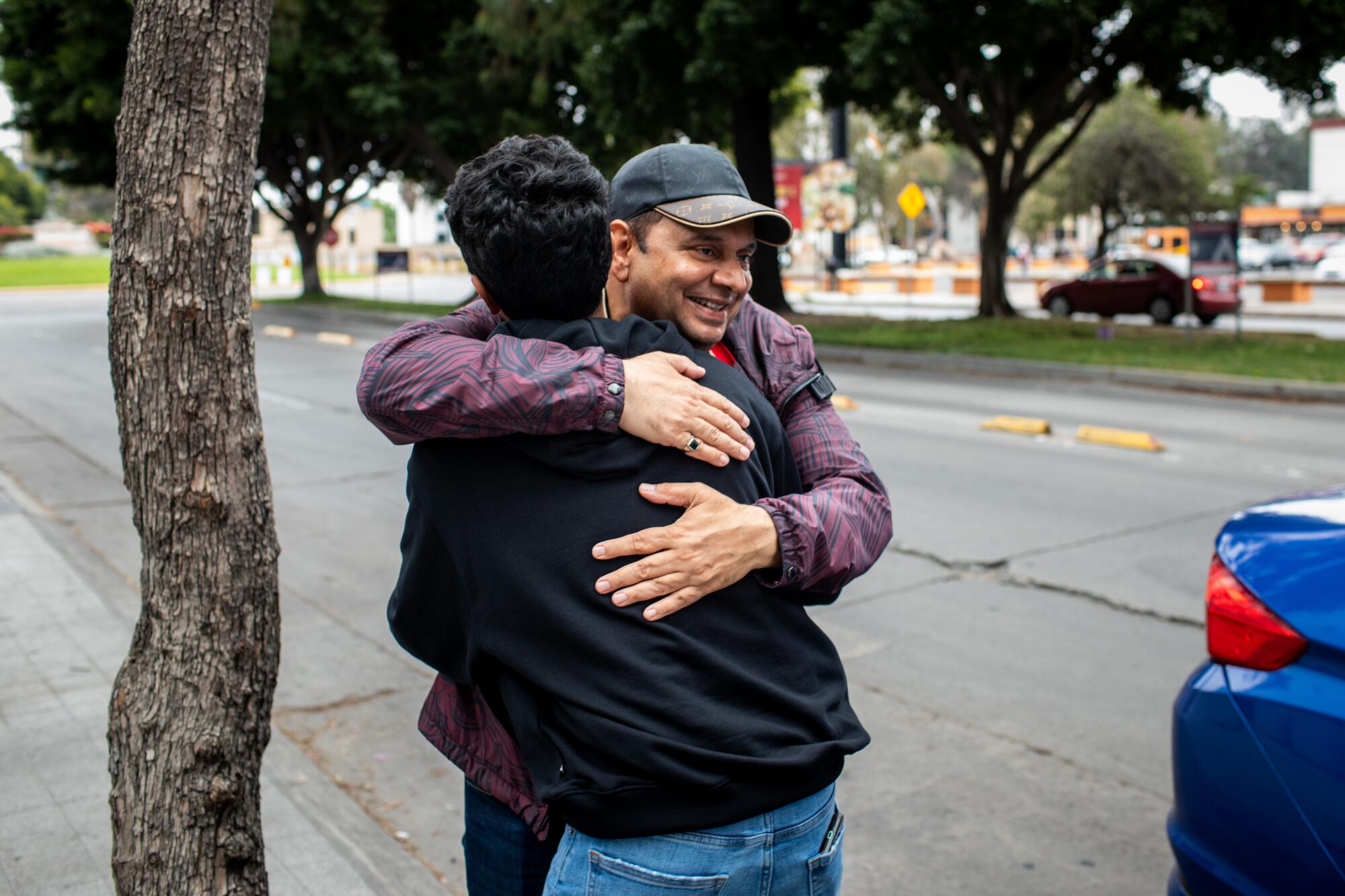
Singh has missed three Father’s Days, Elena’s 21st birthday and his 25th wedding anniversary, which he and Shashi celebrated in June over FaceTime with Champagne. Elena hopes her father will make it back in time for her college graduation in December.
Throughout the years, even before becoming separated from his family, Singh considered leaving the U.S. He could go to Russia, where he lived for 18 years and owns two apartments and an office. Or he could go back to India, where he owns more properties and recently invested in a grocery store chain.
But he feels trapped. Home, for his children, is California.
More to Read
Get the L.A. Times Politics newsletter
Deeply reported insights into legislation, politics and policy from Sacramento, Washington and beyond. In your inbox twice per week.
You may occasionally receive promotional content from the Los Angeles Times.











